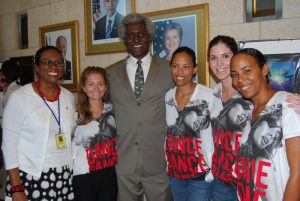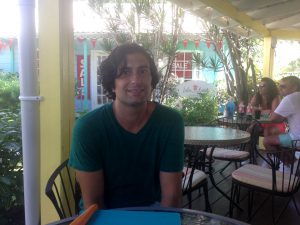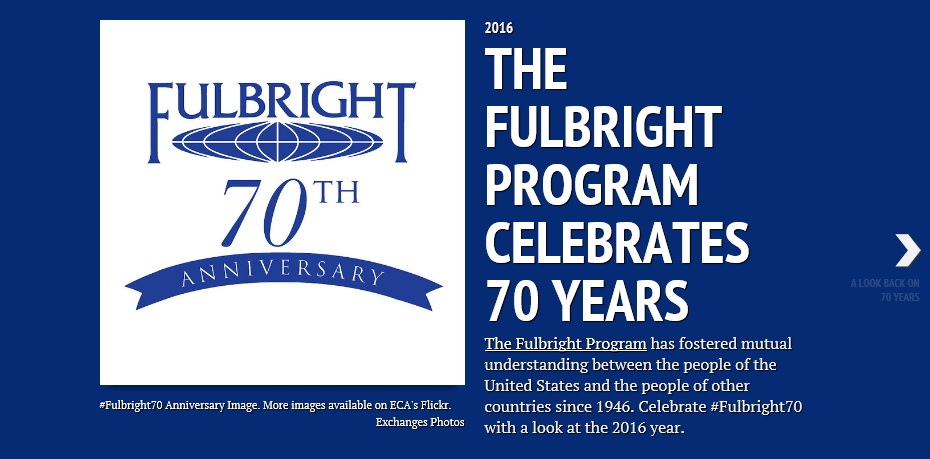Katherine Cloutier is a 2012-2013 Fulbright-mtvU alumna, currently finishing her PhD in ecological-community psychology. Her Fulbright-mtvU grant was a participatory research project that was done in collaboration with a sexual health education program and secondary school students.
Matt Saleh is a 2015-2016 Fulbright U.S. Student in Barbados whose research focuses on collaboration and service coordination among community service providers, government agencies, and secondary schools in school-to-work transition for youth with disabilities.
After learning of the overlap between our two Fulbright projects and experiences in Barbados, we decided to sit down and try to put some of the commonalities into words for the benefit of future Fulbright Students. On the shores of Accra Beach over refreshments at the Tiki Bar, we quickly got to work.

Katherine with Lisa Thompson from PEPFAR (left); Katherine Cloutier, 2012-2013, Barbados, with previous U.S. Ambassador Larry Palmer; and dance4life partners Maisha Hutton, Leila Raphael, and Shakira Emtage-Cave (middle to right) at the 2012 World AIDS Day Event where the participatory action research project was presented by the secondary school students.
Katherine Cloutier: I came to Barbados through a series of planned accidents, I suppose. I remember walking into the office of the Fulbright Program Adviser at Michigan State University, my alma mater, and telling him, “I’m going to get that scholarship; it’s just a matter of when.” The next thing I knew, I was walking off a plane in Barbados on a humid September day in 2012, about to begin my year as a Fulbright-mtvU grantee. Two individuals from my host community partner, dance4life (a sexual health education and youth empowerment program), were waiting for me at the airport. I had never been to the Caribbean before, let alone this particular rock, but I felt so welcomed by these two. Here I am, years later, and I am back in Barbados, my second home.
Matt Saleh: My story is almost the reverse! I was in Barbados for the first time 10 years ago, for a teacher exchange program that placed me in the special needs unit at Charles F. Broome Memorial Primary School. I was nineteen years old at the time and the experience was life altering, both in terms of personal growth and academic ambitions. I developed a real sense of responsibility for the students I worked with, and at 19, responsibility had formerly been a somewhat elusive commodity. I always wanted to come back, so I proposed a Fulbright project highlighting collaborations that could help students with special needs transition from school to the world of work. A kind of natural progression from my first experience.
KC: We met up on several different occasions as our time in Barbados has overlapped quite a bit. Given the shared, community-based elements of our work, we quickly got on the topic of community mobilization and youth empowerment. We discussed that the landscape of social justice oriented community-based work looked quite different in Barbados than what we have seen elsewhere.

Matt Saleh, 2015-2016, Barbados, meeting with his project sponsor in Holetown, Barbados
MS: That’s right, and even in a small country like Barbados, it’s striking how many voices exist within a given NGO community, with both directly and indirectly aligned interests. It’s easy for important voices to get lost, or to talk past one another. In my research, for example, I often found that a community service provider with excellent, focused resources may exist less than two miles from a school with high need children–and they never communicated! Or in some cases, didn’t know that the other even existed. It’s a challenge, but also exciting because there’s a world of opportunity for low cost mobilization of existing resources via increased communication and partnership.
KC: Barbados is home to many impressive community-based organizations, each with resources and expertise. There seems to be great potential to fill gaps as Matt explained in order to (1) utilize each other and (2) leverage increased opportunities for social change and development. Throughout our Fulbright work, we’ve both engaged in an ever evolving learning process to better understanding not only the systems within which we are working, but also where we fit in these systems and where/how these systems fit within and among other systems. We ultimately decided it would be great to develop a resource for future Fulbrighters (in Barbados or elsewhere) that explores elements of community collaboration to better facilitate (1) researcher goals during their Fulbright year and (2) the climate and potential of community collaboration within host countries. Such resources would not only benefit Fulbrighters, but would also contextualize research findings. Since much community-based research exists at the individual measurement level, it is always necessary to carry it up into the systems level perspective in order to acknowledge the way in which ecological settings impact outcomes.
MS: As researchers, it’s been important to meet with stakeholders and kind of visualize (for lack of a better term) what the social network of advocacy and services looks like. A practical approach involves targeting existing skills within the NGO community and proposing partnerships that capitalize on the alignment of expertise and need; areas where objectives are naturally aligned, but have not yet been articulated. Kind of like supporting an indigenous model–in the research parlance–by focusing on the possibilities inhering in the local network of NGOs rather than trying to propose the whole cloth adoption of external policy changes. The experience can be enlightening, because as Katherine pointed out, there’s a lot to learn from considering not only the youth outcome of interest, but also the unique system of providers and community resources that youth goals are actualized within.
Our advice to applicants: If you are planning to submit a Fulbright application, we strongly encourage you to focus your energy on the host country partnership and affiliation building stage ahead of time. A strong partnership with forethought around the project and the potential benefit in the host country will come through in the application. Furthermore, it will have a profound impact on your network and will facilitate the broadening of that network during your time abroad. The right partner makes all the difference.


3 Comments
I am interested in the FulBright Program. I am a holder of a masters degreecin chemistry
Nijah,
To learn more about the Fulbright Program and how to apply, please visit http://www.eca.state.gov/fulbright. Please note that you will need to apply through the country in which you hold citizenship. Good luck!
I’m doing masters in ELT and Eglish linguistics prior to this I did another MA in English literature but it is a matter of sorrow that yet I didn’t able to show my qualification anywhere,besides my thrill to go abroad giving me a pain,I wombat know the process of going abroad and wish to get helped from to do any work for the shake of living a free and spontaneous life .